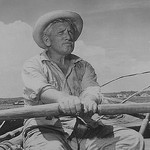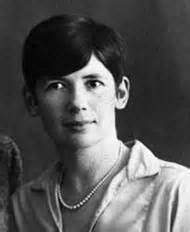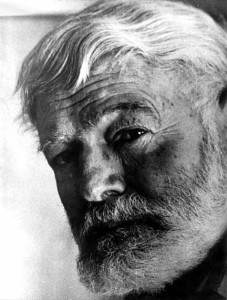#Hemingwayscatholicism
#Hemingwaysfuneral
#HemingwayandPauline
Ernest Hemingway was born a Protestant but converted to Catholicism when he married Pauline Pfeiffer, his second Wife. Pauline was an observant Catholic who took her religion seriously. Hemingway, who was never observant, but arguably always religious told Gary Cooper that becoming a Catholic was one of the best things he’d done in his life. Gary was also Catholic and hem and Coop had a life long bond. (Rent or buy the movie The True Gen about their touching lifelong friendship. They died 6 weeks apart: Coop of cancer and Hem of a self inflicted gun shot wound.) I am excerpting here from an interview with a Hemingway scholar, H. R. Stoneback (Known as Stoney) on this point and on the concept of a pilgrimage. He is interviewd by Allie Baker of The Hemingway Project.


AB: In your essay, “Pilgrimage Variations: Hemingway Sacred Landscapes,” you come to the conclusion that “The ever-recurring center of Hemingway’s work . . . is the notion of pilgrimage.” You write; “The Sun Also Rises, far from being the chronicle of aimless lost generation that it is often taken for, is Hemingway’s first meditation on the theme of pilgrimage.” This is a new idea for readers who have not read your work. Can you elaborate on this? .

Since we now live in an insistently secular culture, where religious concerns are often seen as an embarrassment, it may be useful to state certain things in a straight declarative manner, more directly than I would usually say: 1) Hemingway, raised a Protestant, takes religious questions seriously from the beginning; (and I mean specifically religious questions not vaguely spiritual meanderings); 2) Hemingway, an adult convert to Catholicism, takes his Catholicism seriously; 3) Pilgrimages, specific historical Catholic Pilgrimages, pervade his work in his usual understated and allusive style, and often the deepest and foundational layers of the submerged iceberg of his story and his style are religious and Catholic and Pilgrimage-centered; 4) The Sun Also Rises, for example, has many explicit and implicit references to specifically Catholic Pilgrimage sites–from Sainte Odile to Lourdes to Roncevaux to Santiago de Compostela; 5) When Hemingway the recent formal Catholic convert goes on his honeymoon with his very Catholic bride Pauline to the pilgrimage country of the Camargue, they are pilgrims; you could say they are making a lower-case pilgrimage to the Mediterranean beaches and an upper-case specifically Catholic Pilgrimage to the sacred place of Les Saintes-Maries-de-la-Mer; 6) True pilgrims are never “lost,” certainly never “aimless” for no one is more “aimed” with a fixed, set destination than a pilgrim; Jake Barnes, the Catholic Pilgrim, knows exactly where he is going and why.
AB: When and where do you think Hemingway’s Pilgrimage started? HRS: . When and where did Hemingway’s Pilgrimage start? Hard to say exactly. Maybe when he first lit candles in a Catholic church in Petoskey; when, after his wounding, he was given Last Rites by a Catholic priest on an Italian battlefield; when he went to the great Cathedral of Chartres and changed the title of his novel from The Lost Generation to The Sun Also Rises; when he started carrying and wearing (as he did much of his life) Catholic religious medals; certainly, by the time of the writing of The Sun Also Rises and his Pilgrimages to Les Saintes-Maries-de-la-Mer and Santiago de Compostela soon after, he is a confirmed Catholic Pilgrim.
This is me, Christine, again. Below is a portion of the New York times Obituary of Ernest Hemingway
Ketchum, Idaho, July 4 (UPI)–Ernest Hemingway will be buried under a blanket of red roses; beside one of his closest friends. The grave was dug today in Ketchum Cemetery beside that of Taylor Williams, a hunting and fishing guide who was Mr. Hemingway’s frequent companion for twenty years. He died in 1959.
A simple graveside service was planned. The time was left uncertain pending the arrival of Mr. Hemingway’s son Patrick, who has been hunting in Africa. The services may be held tomorrow.
The Rev. Robert J. Waldemann, Roman Catholic pastor of St. Charles Church in Hailey, Idaho, and of Our Lady of the Snows in Ketchum, will conduct the services. Father Waldemann said that there would be no formal Catholic services. He said there would be no mass and probably no rosary, but he said that the matter of accident or suicide had no bearing on the funeral. “We pass no judgement on that and asked no questions,” he said.
There still was no official decision–and there may never be–as to whether the death of the writer early Sunday from the blast of a 12-gauge shotgun had been an accident or suicide. However, the fact that Mr. Hemingway had been divorced would bar him from a Catholic Church funeral. Catholic sources said there was nothing improper in a Catholic priest saying prayers at graveside.
RIP, Mr. Hemingway.


Interesting…..especially so having just read “A Clean and Lighted Place”, among his numerous other short stories. I could not be entirely sure if he was, mocking religious prayer, or simply attributing this particular “nada” treatment to the mind-set of that one character.
H Ralph! Thanks for commenting. That is a short story that i love despite its grimness. In such a limited space, he says so much. And as you note, there is plenty of room for interpretation and discussion. Thank you again for reading this blog and for reading Hemingway. Best, Christine
‘A Clean and Lighted Place’ is one of my favourites too.
Thank you for this review of Hemingway’s relationship with religion.
I have a question, however. Was it an accepting kind of relationship or a challenging one? Which side was he in the question of whether ’tis nobler in the mind to suffer
The slings and arrows of outrageous fortune, or to take arms against a sea of troubles
and by opposing end them?
What prompted this was a recent discussion I had re. the meaning of ‘moveable feast’. This quote gave the title to his posthumous memoir: “If you are lucky enough to have lived in Paris as a young man, then wherever you go for the rest of your life, it stays with you, for Paris is a moveable feast.”
This last bit, it must be a pun on ‘moveable feasts’ of the Church, the ones that fall on different days every year, unlike those with a fixed date, for example Christmas. If it is a pun, how is it meant? Is it an accepting pun, yes, with all the feasts we have we have another great one? Or is there a challenge, a mockery – yes, we have all those moveable feasts, but there is one you never mention but the one that is supreme to all others, the memory of joyful life in a place you love forever, like Paris?
What do you think?
Alexander! Good good questions and very thought provoking. I know that Hemingway became a Catholic when he married Pauline and he talked to Gary Cooper quite a bit about it. Hem noted that he was glad that he did the conversion. I like the thought of “Moveable feasts of the church.” I don’t know if that is where the title came from but he clearly as his health declined looked back on Paris and Hadley as a happier, better time where there was hope, joy, maybe a simpler life. I am interesting in what others think. Thanks for reading, Alexander. I appreciate it greatly and thanks for writing. Best for the new year, Christine
I’m not a ‘Hemingway expert’. Though my father, an artist, was a fan of Hemingway, & even looked a great deal like him in his later years. One of the few works of Hemingway I know I’ve read is ‘The Old Man & the Sea’, which I think is great. In my opinion, the book title ‘A Moveable Feast’ (which my father always wanted me to read–& pray God I shall) is a ‘play on words’ based upon the moveable feasts of the Church, which Hemingway applies to his experience of life as a writer amongst other writers & artists in Paris. The title sums up a certain artistic ‘view of life’. Until recently, few, I think (even in the U.S.) would have failed to see the title’s ecclesiastical background. I appreciate most of the observations already made. Though, from reading & listening elsewhere, my understanding is that Hemingway became a Catholic when he received Last Rites in Italy during the Great War: ‘As medics carried him from the battlefield, the writer was hit by machine-gun fire in his legs. Arriving at an aid station, he at first refused treatment because others were more seriously wounded. … The largest pieces of shrapnel were removed without benefit of anesthetic, and a Catholic priest administered last rites because the doctors didn’t think Hemingway was going to make it.’ [see: https://www.military.com/off-duty/television/2021/04/05/how-ernest-hemingways-wwi-service-changed-20th-century-fiction.html ] Thus, Hemingway was sacramentally & legally Catholic, a fact he seized upon when he wished to marry Pauline in Paris. Here I cannot say what his belief or practice was, of course, merely that he professed himself Catholic at that point. I do think, though, that the Catholic Church & Faith remained a theme in his life, including when he laid his medal at the feet of Our Lady of Charity at her shrine in Cuba. His possible suicide can be seen as part of a larger picture which includes a possible inherited psychological tendency or frailty. Of the 7 suicides that Mariel Hemingway is aware of in her family, 1 was of Ernest’s father, & 3 of his father’s 6 children (if one assumes that Hemingway did commit suicide). [see: https://www.miamiherald.com/living/health-fitness/article91794397.html ]
Dear Gilbert: This is very interesting. I had not thought/heard about the interpretation of the title “A Moveable Feast.” That book was published posthumously in 1964 (Hem died in 1961), as i recall, and Hemingway’s pal, AE Hotchner came up with the title. And yes, while i can’t say i heard that he was a Catholic who went to Mass often, i do know about the last rites in WW I and Pauline was a serious Catholic. Hem’s great friend for life, Gary Cooper, was also a Catholic and they spoke of it and (I’ve intuited) that it gave both solace as the end drew near. Cooper died 6 weeks before of cancer and while they did not do much talking about it, they had a last phone call in which Cooper said he knew he “would make it back to the barn” before Hemingway. I most sincerely thank you for writing and sharing your thoughts and knowledge. I greatly enjoy learning from comments others make and have read and from hearing what others know. Thank you very much, Gilbert. Best, Christine
Interesting thoughts, I do not understand any of them. Maybe A little? Hemingway was great writer.
God Bless Ernest Hemingway and I pray for his soul.
Thanks for commenting, Dennis. Yes, not so easy to understand. He certainly did not live a religious life but who knows? I agree. God Bless Ernest Hemingway. He had his demons for sure and those of us who care for and are interested in him and his writing hope he has peace. Best to you, Dennis. Christine
I remember reading somewhere years ago that in reply to someone ridiculing the Gospels Hemingway said it seemed to him like they were “good reportage”. I haven’t been able to find the source. Have you ever come across that?
Yes, I do recall something like that, Marie-Jacqueline. Perhaps said to Pauline as she was religious. I also recall that he told Gary Cooper who was Catholic that he (Hemingingway) was very glad that he converted for Pauline and that it gave him comfort. This was near the end for both of them although i don’t know that Hem knew that about himself. I believe Gary Cooper told him he had cancer and not long to live. Cooper said, “I bet i will make it to the barn before you.” Thank you for commenting Marie-Jacquleine. If i run across it, I will post about it and if you do, please write in. Best to you! Christine